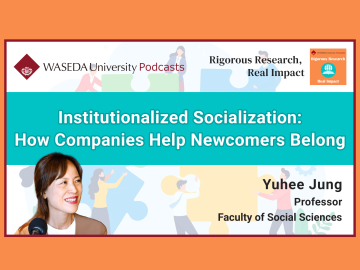Waseda University established the Waseda Research Awards to promote creative research and strengthen international outreach. The program confers Large Research Project Awards to researchers taking the lead in large scale research, and High-Impact Publication Awards to young researchers achieving research results with a high international impact.
From the 2024 academic year, the Leading Research Award was added to recognize researchers engaged in leading and promoting creative research.
Recipients of the 2024 Waseda Research Award(Leading Research)
Winners receive an award certificate and a monetary prize (which is 500,000 Yen for the Leading Research Award).The award is granted to researchers who are engaged in leading and promoting creative research.
Leading Research Category
*in alphabetical order
Chiaki ISHIHARA
Dr. Chiaki Ishihara has published numerous critical works in the field of modern Japanese literature, primarily focusing on literary criticism. His unique approach to analyzing Natsume Soseki’s novels through the lens of various aspects of modern society has established an unparalleled domain in the field. His representative work includes Soseki and Japanese Modernity (Shincho Sensho, 2017). His research has notably been conducted through Japan Society for the Promotion of Science Grants-in-Aid for Scientific Research (KAKENHI), having been selected six times to date, serving as a guide for young humanities researchers developing their skills at universities and related institutions. This approach has been expanded to include interpretations of novels within the social and historical context of their times, focusing on the expressions used in the work to interpret the structure and meaning of the work, without relying on the author’s personal information. One example is his Comprehensive Study on the Representation of Evolution and Degeneration Theory Paradigms in Meiji and Taisho Period Literature (Grant-in-Aid for Scientific Research (C), 2021–2024). Through this work, he successfully illuminates structural issues in modern Japanese society by reexamining modern literature and culture through Natsume Soseki’s literature from the perspective of Max Nordau’s theory of degeneration. His work has been highly evaluated for successfully positioning Soseki’s works within the flow of modern novels since Futabatei Shimei’s Ukigumo by establishing the concept of the “novelistic protagonist”—one who senses and must pause before mysteries—rather than the traditional “narrative protagonist” found in conventional literary criticism.
Toshio OHSHIMA
Dr. Toshio Ohshima has extensively developed research on the role of CRMP (collapsin response mediator protein) family proteins in the nervous system, focusing on CRMP2. His research spans a wide range of areas, including CRMP phosphorylation, neuronal regeneration in the brain and optic nerves, axon guidance, neuronal positioning, axon pruning, and improvement of neurodegenerative disease symptoms. He has conducted highly original and unique research involving various experimental model systems, including injury model in zebrafish and mouse optic nerves and brain tissue. Over the past decade, he has published more than fifty highly-regarded papers in international journals, serving as the corresponding author for most of them, and has developed collaborative research to elucidate this molecular roles in various diseases. This research has potential applications in the treatment of neurodegenerative diseases such as Alzheimer’s disease, Parkinson’s disease, and amyotrophic lateral sclerosis, and is expected to have significant social impact.
Rieko OSU
Throughout history, both in Japan and abroad, extensive research has been conducted on how the external world is internally represented in the mind. However, research has significantly lagged in understanding how mental (or neuroscientific) outputs during human interaction with the external world through movement relate to internal representations and brain mechanisms. Dr. Rieko Osu is one of the few researchers in Japan who has done pioneering work in this underdeveloped field and plays a leading role in its advancement. She has conducted original research on sensorimotor system pathology (including rehabilitation) based on computational neuroscience theory, and continues to produce impactful research spanning psychology, cognitive neuroscience, computational neuroscience, and medicine. She is an exemplary recipient of this award.
Tetsuya KAWANISHI
Dr. Tetsuya Kawanishi is a global pioneer in high-speed multi-level optical modulators, and in recent years has advanced research in microwave photonics based on these modulators, as well as convergence of radio and optical technology developed from these foundations. The high-speed multi-level optical modulators he developed have been commercialized for ultra-high-capacity digital coherent optical communications, and radio-optical convergence has become essential for the future implementation of 6G/7G. These initiatives demonstrate foresight regarding the requirements of future social infrastructure, comprehensively indicating solution guidelines and necessary implementation technologies. This represents outstanding research activity that contributes to both researcher collaboration and the establishment of technology in new research fields. These achievements have been published in numerous papers, including many that have been cited over 100 times.
Beyond academic publications, he has focused on disseminating knowledge by publishing essential reference books on optical modulators in both Japanese and English, and he recently published a book in English on radio-optical convergence. He is also actively involved in government and academic societies and has received numerous academic awards.
Airo HINO
Dr. Airo Hino specializes in electoral studies, voting behavior, party research, and contemporary democracy studies. He has outstanding academic influence in the field of political science due to his intellectual rigor and high social relevance. He is an internationally distinguished scholar who has made significant contributions to understanding political phenomena by addressing urgent social issues such as populism, voter behavior, and institutional design. His work is particularly innovative in applying cutting-edge statistical methods to analyze legislative speeches and social media data, achieving original results that transcend traditional research methodologies. Through numerous publications in internationally prestigious academic journals, invited lectures, and participation in collaborative projects, he has gained high recognition in both academic political science circles and the public sphere, further extending his influence. In addition to these achievements, he has contributed significantly to the development of political science in Japan and globally by securing competitive research funding and taking leadership roles in international collaborative research projects.
Motohiko MIYACHI
Dr. Motohiko Miyachi actively conducts practical human-subject research to elucidate the interactions between physical activity and diet on health, using physiological and epidemiological methods. For example, he tackles highly timely and original research topics such as developing exercise and dietary therapies effective for skeletal muscle anti-aging and investigating the role of gut microbiome in health and disease. His research combines high academic value with direct relevance to modern health issues and is expected to make significant social contributions toward extending healthy life expectancy. His research methodology is also highly regarded for establishing an original research style that is expected to become increasingly important, such as organizing collaborative research networks. In terms of research dissemination, he has produced outstanding results in the number of papers published in top international journals and citation counts. The high number of frequently cited papers demonstrates the high international recognition of his research. For these reasons, he is a worthy recipient of the Waseda Research Award (Leading Research).








